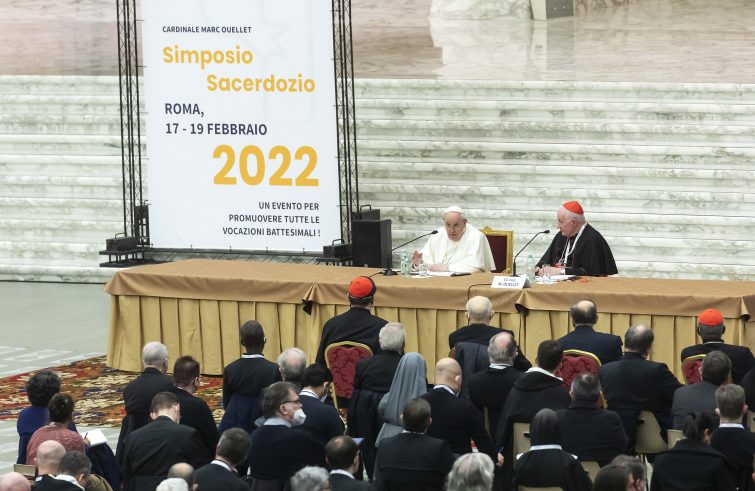
“Celibacy is a gift that the Latin Church preserves, but in order to be lived as a means of sanctification, this gift requires healthy relationships, based on true esteem and goodness that are deeply rooted in Christ”, the Pope said in his opening address at the International Symposium “For a fundamental theology of the priesthood”, underway in Paul VI Hall until February 19. Cardinal Marc Ouellet, Prefect of the Congregation for Bishops, promoted the event in conjunction with the Centre for Research and Anthropology of Vocations. “Without friends and without prayer, celibacy can become an unbearable burden and a counter-witness to the very beauty of the priesthood”, said the Pope. “In fact, when there is priestly fraternity and bonds of true friendship exist, priestly celibacy can be experienced with greater serenity.” The Pope’s extensive and articulate speech, which lasted almost an hour, revolved around “four forms of closeness” that underlie priestly identity: closeness to God, to the bishop, to the priests, to the people of God.
“I am aware that much could be said and theorised about the priesthood,” Francis said in his opening remarks, as he explained that his speech draws on fifty years of priestly life: “I don’t know if these reflections are the ‘swan song’ of my priestly life, but I can certainly assure you that they are the fruit of my own experience.”
“There are always different ways of tackling change,” said the Pope: “The problem is that many actions and attitudes may be useful and good but not all of them have the flavour of the Gospel.”
Francis highlighted two escape mechanisms that should be avoided. These are “the attitudes of the mercenary who sees the wolf coming and flees. He escapes into the past or into the future.” “None of these attitudes will yield mature solutions”,
“Instead”, Francis said, “I welcome the attitude stemming from a trusting acceptance of reality, anchored in the wisdom of the living Tradition of the Church, which enables us to sail into the sea without fear.”
“Some priests, some bishops are in need of being evangelised. This happens, this is the problem today”, noted the Pope. For Francis, “more than recipes or theories, the priest needs concrete instruments to carry out his ministry, his mission and his daily life.” “”Without a meaningful relationship with the Lord, our ministry is bound to become sterile”, he denounced. “I recall some very important moments in my life when this closeness to the Lord proved to be decisive in sustaining me in dark moments”, the testimony: “Without the intimacy of prayer, of spiritual life, of concrete closeness to God that comes by listening to the Word, celebrating the Eucharist, silent adoration, entrustment to Mary, wise guidance, the sacrament of Reconciliation, without these ‘forms of closeness,’ a priest is merely a weary hireling who has none of the benefits of the Lord’s friends.”
“The first task of the bishop is to pray, not to spend time in front of the television”,
is one of the many unscripted remarks with which Francis enriched his speech: “A true priest is capable of letting himself be led into the desert” if his heart is “sufficiently wide to make room for the sufferings of the people entrusted to him.” Instead, far too often, “in priestly life, prayer is practised only as a duty, ignoring the fact that friendship and love cannot be imposed as an external rule: they are a fundamental choice of our heart.”
“When priests close themselves off they when priests close themselves off they lead a bachelor’s life”,
The Pope cautioned, citing envy – “a destructive attitude” that encourages gossip and even “clerical forms of bullying” – as one of the evils of the community. “It is a malady of our priests, and many of you who are formators in seminaries have experienced this.” Fraternal love “is the antidote.” For priests, this love “is not enclosed in a small group, but is expressed as pastoral charity, inspiring its practical implementation in the mission”. “The priestly identity cannot be understood without belonging to the holy faithful people of God,” Francis said, pointing out that
“the people is not a logical category, it is not a mythical category.
The people are asking us for shepherds of the people, not experts in sacredness: shepherds who are gifted with compassion; courageous men, men who don’t hesitate to stop to offer a helping hand to the wounded; men of contemplation who, through closeness to the people, may proclaim the healing power of the Resurrection upon the wounds of the world.”
In our “network society” the “feeling of orphanhood abounds.” “Connected to everything and everyone, the experience of belonging, which is much more than a connection, is missing”,
the Pope denounced. He added: “Through the closeness of the shepherd, the community can be summoned and help the feeling of belonging grow.” “If the shepherd loses his way and goes astray, even his flock will be dispersed and will fall prey to any wolf,” Francis pointed out. Belonging is “the antidote to a distortion of the vocation that stems precisely from forgetting that priestly life is owed to others: to the Lord and to the people He has entrusted to us.” Clericalism and rigidity are a perversion, and not only for priests. “When I think of clericalism, I also think of the clericalisation of the laity,” the Pope pointed out: ” the promotion of a small elite which, revolving around the priest, ultimately distorts the fundamental mission of the laity.
So many clericalised lay people! It is a great temptation.”











